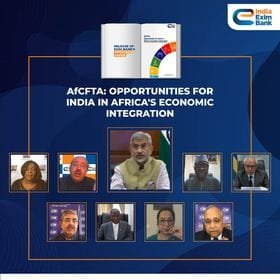Developed RVC and GVC for the long term
India’s private sector could assist African countries in further value addition and integration into agricultural, manufacturing and services value chains, says a study by Exim Bank.
The study: “AfCFTA: Opportunities for India in Africa’s Economic Integration” was released during the 15th CII-EXIM Bank Digital Conclave on India Africa Project Partnership on 22 September 2020.
The study has listed three critical areas for India to enhance its trade and investment relations with the African countries where annual infrastructure deficit is estimated between US$67.6 billion and US$107.5 billion, including transport and utility infrastructure.
The integrated approach would entail facilitating the development of Regional Value Chain (RVC) in Africa and integrating Africa to the Global Value Chain (GVC) in the long run, according to the study.
The study also underlines the need to strengthen Africa’s infrastructure and connectivity, and facilitating trade finance in the African continental, among others.
To evaluate Africa’s present standing in the GVC, the Study draws an analysis of Africa’s GVC participation as well as GVC position.
The majority of the African economies tend to have a modest GVC participation rate and higher GVC position rate due to their high domestic value-added exports (mainly primary commodities) and involvement in upstream activity (initial part of the value chain).
Africa has taken cognizance of this intra-continental shortage of trade and its increased efforts towards economic integration are reflected in the agreement establishing the African Continental Free Trade Area (AfCFTA) which came into force on 30 May 2019, the study pointed out.
With the onset of the COVID-19 pandemic, the importance of integrating Africa and building resilient regional value chains has become even more pertinent.
The study highlights that India and Africa could step up their cooperation in key areas like Agro-processing, healthcare including pharmaceuticals and renewable energy to ensure a sustainable path for economic recovery.
The study also highlights that infrastructure plays a critical role in facilitating intra-regional trade.
To facilitate infrastructure development and address the financing gap, innovative mechanisms of financing besides traditional financing methods need to be explored to increase private sector involvement, which could include, among others, blended finance and PPP.
Additionally, limited access to trade finance remains an overriding constraint to Africa’s trade, particularly for SMEs.
The study proposes the need for increased engagement of Indian financial institutions with regional institutions in Africa to strengthen the financial institutional capacity of Africa.
It has been estimated that trade under AfCFTA would increase intra-African trade by at least 52.3%. However, the effectiveness of this agreement is subject to improved trade-related infrastructure and transit costs.
India and Africa’s robust trade synergy is testimony to the longstanding partnership built over the years. India has continued to remain Africa’s second-largest trading partner since 2017, the study pointed out.
However, India does not feature in the top five investors in Africa (in terms of FDI stock).
Therefore, there is an increasing need for India to give AfCFTA priority on its foreign policy map by fostering innovative strategies that optimise growth and address the development needs of the region. #trade #FTA #exports #investigations #infrastructure /fiinews.com









